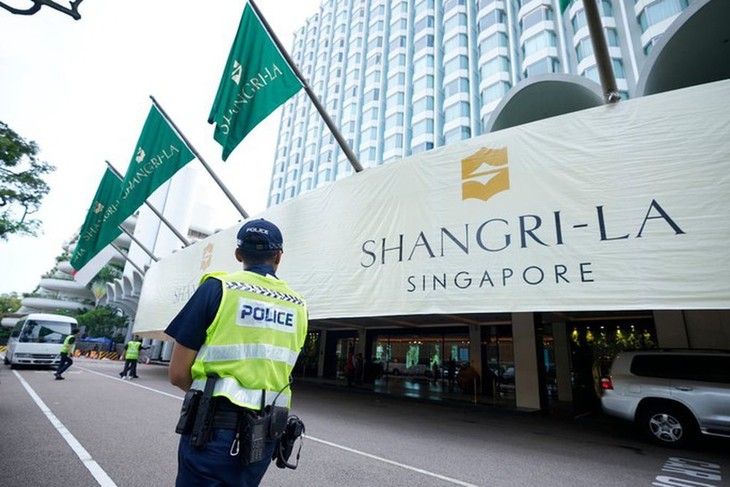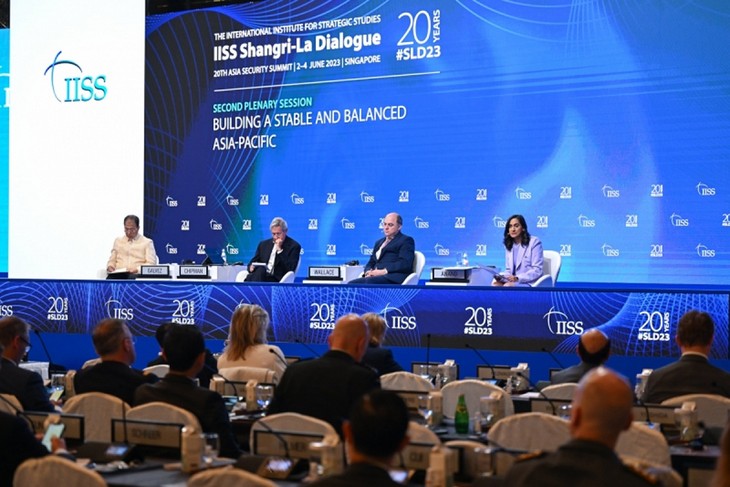(VOVWORLD) -The 20th Asia Security Summit, known as the Shangri-La Dialogue, ended last Sunday at Singapore's Shangri-La hotel. The Dialogue focused on global security issues, impacts on Asia, seeking solutions to build trust, and cooperating to deal with challenges.
 (Photo: AP) (Photo: AP) |
The Shangri-La Dialogue was an open and neutral forum for parties to exchange views on key defense and security issues in the Asia-Pacific.
This year 500 delegates attended the event, with seven plenary sessions, six parallel discussions, and a number of bilateral meetings on the sidelines. The large attendance reflects the fact that the Asia-Pacific region has drawn the world’s attention, particularly to regional security issues like competition between powers, territorial disputes, challenges to the observance of international law, and the use of military force in dealing with conflicts.
Collective responsibility and international law
The Shangri-La Dialogue concentrated on building trust, the role of the major powers, and the responsibility of collectives and international law in managing risks and competition. Many delegates said hotspots like Ukraine, North Korea, and Sudan show that unilateral actions can shake confidence in common law and international relations, disrupting stability and security around the world.
Australian Prime Minister Anthony Albanese said the Shangri-La Dialogue promoted frank, constructive discussions to uphold regional peace, security, and stability, which is not a task that a single nation can shoulder. He said regional prosperity is driven by sharing, and stability in the Asia-Pacific can only be achieved through collective responsibility.
Canadian Defense Minister Anita Anand said Canada always seeks coexistence and cooperation. The Indo-Pacific Strategy, she said, cannot be just a policy document, building a safe, stable region requires tangible contributions.
The Shangri-La Dialogue drew many representatives from the European Union. Europe and the Asia-Pacific have a direct interest in each other's security, and they want to be reliable partners in promoting security. EU High Representative for Foreign Affairs and Security Policy Josep Borrell said the challenges we are facing don't allow solutions that don’t include strong cooperation.
 (Photo: IISS) (Photo: IISS) |
Promoting a shared vision
A highlight of this year's event was a discussion of "America's leadership in the Indo-Pacific". Defense Secretary Lloyd Austin affirmed the US's commitment to a free and open Indo-Pacific region. He said security in the Indo-Pacific cannot be ignored and any unilateral attempt to change the status quo in the region is unacceptable. The US, he said, will join hands with partners to promote a shared vision for the region.
The US-China relationship was one of the biggest concerns. Although Secretary Austin and Chinese Defense Minister Li Shangfu outlined contrasting approaches to peace, stability, and security in the Asia-Pacific, most observers agree that neither the US nor China wants a new cold war. A warmer, more positive direction in US-China relations is something many countries are hoping for.
First held in 2002, the Shangri-La Dialogue has upheld its role as a leading forum on regional and global security.